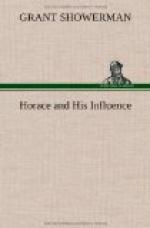“Without sustained inspiration, without profundity of thought, without impassioned song,” writes Duff, “he yet pierces to the universal heart.... His secret lies in sanity rather than impetus. Kindly and shrewd observer of the manifold activities of life, he draws vignettes therefrom and passes judgments thereon which awaken undying interest. Non omnis moriar—he remains fresh because he is human.”
Horace’s philosophy of life may be imperfect for the militant humanitarian and the Christian, but, as a matter of fact, it is a complete and perfect thing in itself. Horace does not fret or fume. He is not morbid or unpleasantly melancholy. It is true that “his tempered and polished expression of common experience, free from transports and free from despairs, speaks more forcibly to ripe middle age than to youth,” but it is not without its appeal also to youth. Horace sums up an attitude toward existence which all men, of whatever nation or time, can easily understand, and which all, at some moment or other, sympathize with. Whether they believe in his philosophy of life or not, whether they put it into practice or not, it is always and everywhere attractive,—attractive because founded on clear and sympathetic vision of the joys and sorrows that are the common lot of men, attractive because of its frankness and manly courage, and, above all, attractive because of its object. So long as the one great object of human longing is peace of mind and heart, no philosophy which recognizes it will be without followers. The Christian is naturally unwilling to adopt the Horatian philosophy as a whole, but with its summum bonum, and with many of its recommendations, he is in perfect accord. Add Christian faith to it, or add it, so far as is consonant, to Christian faith, and either is enriched.
We are better able now to appreciate the dynamic power of Horace the person. We may see it at work in the fostering of friendly affection, in the deepening of love for favorite spots of earth, in the encouragement of righteous purpose, in the true judging of life’s values.
Horace is the poet of friendship. With his address to “Virgil, the half of my soul,” his references to Plotius, Varius, and Virgil as the purest and whitest souls of earth, his affectionate messages in Epistle and Ode, he sets the heart of the reader aglow with love for his friends. “Nothing, while in my right mind, would I compare to the delight of a friend!” What numbers of men have had their hearts stirred to deeper love by the matchless ode to Septimius:
“S_eptimius, who with me would brave_
F_ar Gades, and Cantabrian
land_
U_ntamed by Rome, and Moorish wave_
T_hat whirls the sand_;
“F_air Tibur, town of Argive kings_,
T_here would I end my days
serene_,
A_t rest from seas and travelings_,
A_nd service seen_.
“S_hould angry Fate those wishes
foil_,
T_hen let me seek Galesus,
sweet_
T_o skin-clad sheep, and that rich soil_,
T_he Spartan’s seat_.




